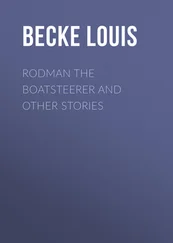Louis Becke - Rídan The Devil And Other Stories
Здесь есть возможность читать онлайн «Louis Becke - Rídan The Devil And Other Stories» — ознакомительный отрывок электронной книги совершенно бесплатно, а после прочтения отрывка купить полную версию. В некоторых случаях можно слушать аудио, скачать через торрент в формате fb2 и присутствует краткое содержание. Жанр: foreign_prose, literature_19, foreign_antique, на английском языке. Описание произведения, (предисловие) а так же отзывы посетителей доступны на портале библиотеки ЛибКат.
- Название:Rídan The Devil And Other Stories
- Автор:
- Жанр:
- Год:неизвестен
- ISBN:нет данных
- Рейтинг книги:4 / 5. Голосов: 1
-
Избранное:Добавить в избранное
- Отзывы:
-
Ваша оценка:
- 80
- 1
- 2
- 3
- 4
- 5
Rídan The Devil And Other Stories: краткое содержание, описание и аннотация
Предлагаем к чтению аннотацию, описание, краткое содержание или предисловие (зависит от того, что написал сам автор книги «Rídan The Devil And Other Stories»). Если вы не нашли необходимую информацию о книге — напишите в комментариях, мы постараемся отыскать её.
Rídan The Devil And Other Stories — читать онлайн ознакомительный отрывок
Ниже представлен текст книги, разбитый по страницам. Система сохранения места последней прочитанной страницы, позволяет с удобством читать онлайн бесплатно книгу «Rídan The Devil And Other Stories», без необходимости каждый раз заново искать на чём Вы остановились. Поставьте закладку, и сможете в любой момент перейти на страницу, на которой закончили чтение.
Интервал:
Закладка:
‘Small reef birds (tern) were present in prodigious numbers, skimming the waters of the coast with an erratic, rapid, but yet graceful flight, like that of the stormy petrel. At night they assembled in vast numbers on an islet in the lagoon, to roost on the trees. They are about the size of an Australian snipe, and their forms are models of elegance and beauty. Their plumage is in true slate colour, the secondary wings are white, and a narrow white zone surrounds each eye; their legs and feet are a pale blue, with white webs.
‘Every now and then as we, during our visit, walked along the snow-white beaches, great crowds of golden-winged plover and tiny snipe sprang skyward, and swept in graceful gyrations over the broad expanse of water, till they settled upon some sandy spit or spot of projecting reef; and, indeed, the immense concourse or frigate birds, boobies, terns, petrels and other aquatic denizens of the island filled us with boundless astonishment.
‘At night time there crept out from their lairs in the loose coral shingle that lined the scrub at high-water mark, incredible numbers of huge “land lobsters”—the “robber crab” of the Pacific Islands. They all crawled to within a few feet of the placid waters of the lagoon, where they remained motionless, as if awaiting some event—possibly to prey upon the smaller species of crustaceæ and turtle eggs.’
Christmas Island, in its structure and elevation, much resembles Palmerston Island, Arrecifos or Providence Island (the secret rendezvous of Captain ‘Bully’ Hayes), Brown’s Range, and other low-lying atolls of the North and South Pacific. The greater part of the interior of the island is, however, despite the vast number of coco-nuts planted upon it during the past ten years, still sadly deficient in cheerful vegetation.
The waters of the lagoon vary greatly in depth, but generally are shallow and much broken up by sandy spits, reefs and huge coral boulders which protrude at low water, and the surface is much subject to the action of the trade wind, which, when blowing strong, lashes them into a wild surf; and the low shores of the encircling islets, that form a continuous reef-connected chain, are rendered invisible from the opposite side by the smoky haze and spume which ascends in clouds from the breaking surf that rolls and thunders on the outer barrier reefs.
In the interior no fresh water is obtainable, although in the rainy season some of a brackish quality can be had by sinking shallow wells. This water rises and falls in the wells in unison with the tides. Here and there are very extensive swamps of sea-water, evaporrated to a strong brine; the margins of these are clothed with a fair growth of the pandanus or screw-pine palm, the fruit of which, when ripe, forms a nutritious and palatable food for the natives of the Equatorial Pacific Islands.
The island where Captain Cook set up his observatory is but a small strip of sandy soil, clothed with a few coco-palms, some screw-palms (pandanus), and a thick-matted carpet of a vine called At At by the natives. The only quadrupeds are rats, and some huge land tortoises, similar to those of the Galapagos Islands. They are most hideous-looking creatures, and, being of nocturnal habits, like the great robber crab, are apt to produce a most terrifying impression upon the beholder, if met with in the loneliness of the night. The present human occupants of Christmas Island are, however, well supplied with pigs and poultry; and though this far-away dot of Britain’s empire beyond the seas is scarcely known to the world, and visited but twice a year by a trading vessel from Sydney, they are happy and contented in their home in this lonely isle of the mid-Pacific.
BILGER, OF SYDNEY
A death in the family brought about my fatal acquaintance with Bilger. A few days after the funeral, as my sister and I sat talking on the verandah of our cottage (which overlooked the waters of Sydney Harbour) and listened to the pouring rain upon the shingled roof, we saw a man open the garden gate and come slowly up to the house. He carried an ancient umbrella, the tack lashings of which on one side had given way entirely, showing six bare ribs. As he walked up the path, his large, sodden boots made a nasty, squelching sound, and my sister, who has a large heart, at once said, ‘Poor creature; I wonder who he is. I hope it isn’t the coal man come for his money.’
He went round to the back door and, after letting himself drain off a bit, knocked gently and with exceeding diffidence.
I asked him his business. He said he wanted to see my wife.
‘Not here. Gone away for a month.’
‘Dear, dear, how sad! Broken down, no doubt, with a mother’s grief. Is there any other lady in the family whom I could see?’
‘What the deuce do you want?’ I began angrily; then, as he raised his weak, watery eyes to mine, and I saw that his grey hairs were as wet as his boots, I relented. Perhaps he was someone who knew my wife or her people, and wanted to condole with her over the death of her baby. He looked sober enough, so, as he seemed much agitated, I asked him to sit down, and said I would send my sister to him. Then I went back to my pipe and chair. Ten minutes later my sister Kate came to me with her handkerchief to her eyes.
‘ Do go and see the old fellow. He has such a sympathetic nature. I’m sure I should have cried aloud had I stayed any longer. Anyone would think he had known poor little Teddie ever since he was born. I’ve asked Mary to make him a cup of tea.’
‘Who is he?’
‘I don’t know his name, but he seems so sympathetic. And he says he should be so pleased if he might see you again for a few minutes. He says, too, that you have a good and kind face. I told him that you would be sure to take at least a dozen of those in cream and gold. There’s nothing at all vulgar; quite the reverse.’
‘What are you talking about, Kate? Who is this sodden old lunatic, and what on earth are you crying for?’
My sister nearly sobbed. ‘I always thought that what you derisively termed “mortuary bards” were horrid people, but this old man has a beautiful nature. And he’s very wet—and hungry too, I’m sure; and Mary looks at him as if he were a dog. Do try and help him. I think we might get one or two dozen cream and gold cards, and two dozen black-edged.
And then he’s a journalist, too. He’s told me quite a sad little story of his life struggle, and the moment I told him you were on the Evening News he quite brightened up, and said he knew your name quite well.’
‘Kate,’ I said, ‘I don’t want to see the man. What the deuce does he want? If he is one of those loafing scoundrels of undertakers’ and mortuary masons’ touts, just send him about his business; give him a glass of whisky and tell Mary to clear him out.’
My sister said that to send an old man out in such weather was not like me . Surely I would at least speak a kind word to him.
In sheer desperation I went out to the man. He addressed me in husky tones, and said that he desired to express his deep sympathy with me in my affliction, also that he was ‘a member of the Fourth Estate.’ Seven years before he had edited the Barangoora News , but his determined opposition to a dishonest Government led to his ruin, and now—
‘All right, old man; stow all that. What do you want?’
He looked at me reproachfully, and taking up a small leather bag, said that he represented Messrs –, ‘Monumental Masons and Memorial Card Designers and Printers,’ and should feel pleased if I would look at his samples.
He was such a wretched, hungry-looking, down-upon-his-beam-ends old fellow, that I could not refuse to inspect his wares. And then his boots filled me with pity. For such a little man he had the biggest boots I ever saw—baggy, elastic sides, and toes turned up, with the after part of the uppers sticking out some inches beyond the frayed edges of his trousers. As he sat down and drew these garments up, and his bare, skinny legs showed above his wrecked boots, his feet looked like two water-logged cutters under bare poles, with the water running out of the scuppers.
Читать дальшеИнтервал:
Закладка:
Похожие книги на «Rídan The Devil And Other Stories»
Представляем Вашему вниманию похожие книги на «Rídan The Devil And Other Stories» списком для выбора. Мы отобрали схожую по названию и смыслу литературу в надежде предоставить читателям больше вариантов отыскать новые, интересные, ещё непрочитанные произведения.
Обсуждение, отзывы о книге «Rídan The Devil And Other Stories» и просто собственные мнения читателей. Оставьте ваши комментарии, напишите, что Вы думаете о произведении, его смысле или главных героях. Укажите что конкретно понравилось, а что нет, и почему Вы так считаете.












